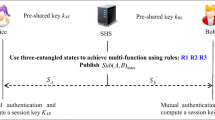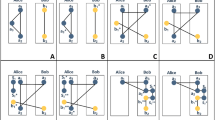Abstract
Quantum key agreement (QKA) is an important branch of quantum cryptography. In this paper, we propose a mutual authenticated semi-honest key agreement scheme with Greenberger-Home-Zeilinger-like (GHZ-like) state. A semi-honest third-party Trent can help Alice and Bob to achieve mutual authentication and key agreement without getting any information about the session key between them. Firstly, Alice and Bob have shared necessary information with Trent respectively in a secure way, and keep each other confidential. Trent prepares the three-particle GHZ-like states and shares them with Alice and Bob. Secondly, Trent uses hash security function to get a set with equal subscripts, and then divides into authentication set and negotiation set. The authentication set is used to realize the security authentication of three-party identities, while the negotiation set is used for negotiating the session key. Finally, on the premise of passing the three-party authentication, Alice and Bob carry out the GHZ-like states encryption communication according to the negotiation subset provided by the third party. Through security analysis and efficiency analysis, our proposed protocol can effectively resist external eavesdropping and internal eavesdropping, and have high communication efficiency.



Similar content being viewed by others

References
Zhou, N., Zeng, G., Xiong, J.: Quantum key agreement protocol. Electron. Lett. 40(18), 1149–1150 (2004)
Tsai, C.W., Hwang, T.: On Quantum Key Agreement Protocol. Technical Report C-S-I-E, NCKU, Taiwan (2009)
Liu, S.L., Zheng, D., Chen, K.F.: Analysis of information leakage in quantum key agreement. J. Shanghai Jiaotong Univ. (Sci.). E-11(2), 219–223 (2006)
Chong, S.K., Hwang, T.: Quantum key agreement protocol based on BB84. Opt. Commun. 283(6), 1192–1195 (2010)
Liu, B., Gao, F., Huang, W., Wen, Q.-Y.: Multiparty quantum key agreement with single particles. Quantum Inf. Process. 12, 1797–1805 (2013)
Shi, R.-H., Zhong, H.: Multi-party quantum key agreement with bell states and bell measurements. Quantum Inf. Process. 12, 921–932 (2013)
Sun, Z., Huang, J., Wang, P.: Efficient multiparty quantum key agreement protocol based on commutative encryption. Quantum Inf. Process. 15(5), 2101–2111 (2016)
Mohajer, R., Eslami, Z.: Cryptanalysis of a multiparty quantum key agreement protocol based on commutative encryption. Quantum Inf. Process. 16(8), Article number: 197 (2017)
Huang, W., Su, Q., Liu, B., He, Y.-H., Fan, F., Xu, B.-J.: Efficient multiparty quantum key agreement with collective detection. Sci. Rep. 7(1), (2017)
Huang, W.-C., Yang, Y.-K., Jiang, D., Gao, C.-H., Chen, L.-J.: Designing secure quantum key agreement protocols against dishonest participants Int. J. Theor. Phys. 58(12), 4093–4104, (2019)
Tang, R.-H., Zhang, C., & Long, D.-Y.: An efficient circle-type multiparty quantum key agreement protocol with single particles. Int. J. Mod. Phys. B. (12), 2050199, 1–19, (2020)
Hsueh, C.C., Chen, C.Y.: Quantum key agreement protocol with maximally entangled states. In: Proceed ings of the 14th Information Security Conference (ISC 2004), pp. 236–242. National Taiwan University of Science and Technology, Taipei, Taiwan, 10–11 Jun. (2004)
Chong, S.-K., Tsai, C.-W., Hwang, T.: Improvement on “quantum key agreement protocol with maximally entangled states”. Int. J. Theor. Phys. 50, 1793–1802 (2011)
Shukla, C., Alam, N., Pathak, A.: Protocols of quantum key agreement solely using bell states and bell measurement. Quantum Inf. Process. 13(11), 2391–2405 (2014)
Zhu, Z.-C., Hu, A.-Q., Fu, A.-M.: Improving the security of protocols of quantum key agreement solely using bell states and bell measurement. Quantum Inf. Process. 14(11), 4245–4254 (2015)
Shen, D.-S., Ma, W.-P., Wang, L.: Two-party quantum key agreement with four-qubit cluster states. Quantum Inf. Process. 13(10), 2313–2324 (2014)
Xu, G.-B., Wen, Q.-Y., Gao, F., Qin, S.-J.: Novel multiparty quantum key agreement protocol with GHZ states. Quantum Inf. Process. (2014). https://doi.org/10.1007/s11128-014-0816-9
Gu, J., Hwang, T.: Improvement of “novel multiparty quantum key agreement protocol with GHZ states”. Int. J. Theor. Phys. 56, 3108–3116 (2017). https://doi.org/10.1007/s10773-017-3478-4
He, Y.-F., Ma, W.-P.: Quantum key agreement protocols with four-qubit cluster states. Quantum Inf. Process. 14(9), 3483–3498 (2015)
He, Y.-F., Ma, W.-P.: Two-party quantum key agreement based on four-particle GHZ states. Int. J. Quantum. Inf. 14(1), 1650007 (2016) (8 pages)
He, Y., Ma, W.: Two robust quantum key agreement protocols based on logical GHZ states. Mod. Phys. Lett. B. 31(03), 1750015 (2017)
Zhou, N.-R., Zhu, K.-N., Wang, Y.-Q.: Three-party semi-quantum key agreement protocol. Int. J. Theor. Phys. 59, 663–676 (2020)
Jie Tang, Lei Shi, Jiahua Wei.: Controlled quantum key agreement based on maximally three-qubit entangled states. Modern Physics Letters B. 34, (18) 2050201 (2020)
Zhang, W.W., Zhang, K.J.: Cryptanalysis and improvement of the quantum private comparison protocol with semi-honest third party. Quantum Inf. Process. 12(5), 1981–1990 (2013)
Zheng, X., Kuang, C., Liang, W.: Controlled quantum dialogue with authentication protocol on a basis of GHZ-like state. Quantum Inf. Process. 19(8), (2020)
Cabello, A.: Quantum key distribution in the Holevo limit. Phys. Rev. Lett. 85, 5633–5638 (2000)
Acknowledgements
This work was supported by the Liaoning Provincial Natural Science Foundation of China (Grant No. 2019-MS-286), and Basic Scientific Research Project of Liaoning Provincial Department of Education (Grant No. LJC202007).
Author information
Authors and Affiliations
Corresponding author
Additional information
Publisher’s Note
Springer Nature remains neutral with regard to jurisdictional claims in published maps and institutional affiliations.
Rights and permissions
About this article
Cite this article
Zhu, H., Wang, C. & Li, Z. Semi-Honest Three-Party Mutual Authentication Quantum Key Agreement Protocol Based on GHZ-Like State. Int J Theor Phys 60, 293–303 (2021). https://doi.org/10.1007/s10773-020-04692-x
Received:
Accepted:
Published:
Issue Date:
DOI: https://doi.org/10.1007/s10773-020-04692-x



